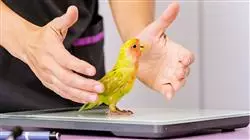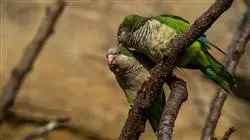University certificate
The world's largest faculty of veterinary medicine”
Introduction to the Program
Caring for avian patients presents a great challenge for veterinarians, who must have specialized training in this field”

One of the main attractions of working with birds is the fascinating diversity of patients treated and the challenge their pathologies present to veterinarians.
However, before treating these unique species, one must specialize in the essentials: the internal structure and function of birds.
The ability to fly has made it possible for birds to occupy a wide diversity of habitats, consequently developing numerous adaptations to obtain sustenance. This characteristic has resulted in almost 10,000 species in the taxonomic classification of birds.
Physical examination is a fundamental part of the diagnosis of avian disorders and involves handling and restraining the bird in order to perform the necessary examinations for its care. But before handling birds, some very important prerequisites need to be considered, such as collecting previous information on the patient by means of a complete as possible anamnesis.
This Postgraduate diploma includes all the necessary requirements to reach adequate diagnoses, from start to final objective, and properly treat avian patients. It also includes all the necessary requirements to provide a suitable home for birds kept in captivity.
Moreover, it is worth mentioning that birds are susceptible to a great variety of diseases. Therefore, this program develops specialized knowledge of the different pathologies, such as those derived from incorrect handling, like capture paresis, a syndrome caused by stress produced during wild bird capture; it also studies complete physiopathogenesis and the changes produced in the animals, which causes a gread deal of deaths that could be avoided by having the right knowledge; finally, it covers the problems caused by poor nutrition, among other aspects.
In short, this training provides students with specific tools and skills to successfully develop their professional activity in the wide field of avian medicine and surgery. It addresses key competencies such as knowledge of the reality and daily practice of the veterinary professional, and develops responsibility in the monitoring and supervision of their work, as well as communication skills within the essential teamwork.
As it is an online program, students will not be bound by fixed schedules or the need to move to another physical location, but rather, they can access the content at any time of the day, balancing their professional or personal life with their academic life.
Do not miss the opportunity to study this program with us. It's the perfect opportunity to advance your career”
This Postgraduate diploma in Daily Consultation Knowledge contains the most complete and up-to-date educational program on the market. The most important features include:
- Practical cases presented by experts in avian medicine
- The graphic, schematic, and eminently practical contents with which they are created, provide scientific and practical information on the disciplines that are essential for professional practice
- Latest developments in veterinary consultation care
- Practical exercises where the self-assessment process can be carried out to improve learning
- Special emphasis on innovative methodologies in avian medicine
- Theoretical lessons, questions to the expert, debate forums on controversial topics, and individual reflection assignments
- Content that is accessible from any fixed or portable device with an Internet connection
This Postgraduate diploma is the best investment you can make when choosing a refresher program to expand your existing knowledge of the subject matter”
Its teaching staff includes professionals from the veterinary field, who bring the experience of their work to this training, as well as recognized specialists from leading societies and prestigious universities.
Its Multimedia Content, elaborated with the latest Educational Technology, will allow the Professional a situated and contextual learning, that is to say, a Simulated Environment that will provide an immersive specialization programmed to train in real situations.
This program is designed around Problem-Based Learning, whereby the professional must try to solve the different professional practice situations that arise during the program. For this purpose, the professional will be assisted by an innovative interactive video system created by renowned and experienced experts in avian in veterinary consultations with extensive experience.
This training comes with the best didactic material, providing you with a contextual approach that will facilitate your learning"

This 100% online Postgraduate diploma will allow you to combine your studies with your professional work while increasing your knowledge in this field"
Why study at TECH?
TECH is the world’s largest online university. With an impressive catalog of more than 14,000 university programs available in 11 languages, it is positioned as a leader in employability, with a 99% job placement rate. In addition, it relies on an enormous faculty of more than 6,000 professors of the highest international renown.

Study at the world's largest online university and guarantee your professional success. The future starts at TECH”
The world’s best online university according to FORBES
The prestigious Forbes magazine, specialized in business and finance, has highlighted TECH as “the world's best online university” This is what they have recently stated in an article in their digital edition in which they echo the success story of this institution, “thanks to the academic offer it provides, the selection of its teaching staff, and an innovative learning method aimed at educating the professionals of the future”
A revolutionary study method, a cutting-edge faculty and a practical focus: the key to TECH's success.
The most complete study plans on the university scene
TECH offers the most complete study plans on the university scene, with syllabuses that cover fundamental concepts and, at the same time, the main scientific advances in their specific scientific areas. In addition, these programs are continuously being updated to guarantee students the academic vanguard and the most in-demand professional skills. In this way, the university's qualifications provide its graduates with a significant advantage to propel their careers to success.
TECH offers the most comprehensive and intensive study plans on the current university scene.
A world-class teaching staff
TECH's teaching staff is made up of more than 6,000 professors with the highest international recognition. Professors, researchers and top executives of multinational companies, including Isaiah Covington, performance coach of the Boston Celtics; Magda Romanska, principal investigator at Harvard MetaLAB; Ignacio Wistumba, chairman of the department of translational molecular pathology at MD Anderson Cancer Center; and D.W. Pine, creative director of TIME magazine, among others.
Internationally renowned experts, specialized in different branches of Health, Technology, Communication and Business, form part of the TECH faculty.
A unique learning method
TECH is the first university to use Relearning in all its programs. It is the best online learning methodology, accredited with international teaching quality certifications, provided by prestigious educational agencies. In addition, this disruptive educational model is complemented with the “Case Method”, thereby setting up a unique online teaching strategy. Innovative teaching resources are also implemented, including detailed videos, infographics and interactive summaries.
TECH combines Relearning and the Case Method in all its university programs to guarantee excellent theoretical and practical learning, studying whenever and wherever you want.
The world's largest online university
TECH is the world’s largest online university. We are the largest educational institution, with the best and widest online educational catalog, one hundred percent online and covering the vast majority of areas of knowledge. We offer a large selection of our own degrees and accredited online undergraduate and postgraduate degrees. In total, more than 14,000 university degrees, in eleven different languages, make us the largest educational largest in the world.
TECH has the world's most extensive catalog of academic and official programs, available in more than 11 languages.
Google Premier Partner
The American technology giant has awarded TECH the Google Google Premier Partner badge. This award, which is only available to 3% of the world's companies, highlights the efficient, flexible and tailored experience that this university provides to students. The recognition as a Google Premier Partner not only accredits the maximum rigor, performance and investment in TECH's digital infrastructures, but also places this university as one of the world's leading technology companies.
Google has positioned TECH in the top 3% of the world's most important technology companies by awarding it its Google Premier Partner badge.
The official online university of the NBA
TECH is the official online university of the NBA. Thanks to our agreement with the biggest league in basketball, we offer our students exclusive university programs, as well as a wide variety of educational resources focused on the business of the league and other areas of the sports industry. Each program is made up of a uniquely designed syllabus and features exceptional guest hosts: professionals with a distinguished sports background who will offer their expertise on the most relevant topics.
TECH has been selected by the NBA, the world's top basketball league, as its official online university.
The top-rated university by its students
Students have positioned TECH as the world's top-rated university on the main review websites, with a highest rating of 4.9 out of 5, obtained from more than 1,000 reviews. These results consolidate TECH as the benchmark university institution at an international level, reflecting the excellence and positive impact of its educational model.” reflecting the excellence and positive impact of its educational model.”
TECH is the world’s top-rated university by its students.
Leaders in employability
TECH has managed to become the leading university in employability. 99% of its students obtain jobs in the academic field they have studied, within one year of completing any of the university's programs. A similar number achieve immediate career enhancement. All this thanks to a study methodology that bases its effectiveness on the acquisition of practical skills, which are absolutely necessary for professional development.
99% of TECH graduates find a job within a year of completing their studies.
Postgraduate Diploma in Everyday Consultation Skills
In an increasingly connected and constantly evolving world, it is essential to have skills that allow us to face daily challenges effectively. If you are looking to acquire the necessary tools to understand, analyze and take advantage of the avalanche of information that surrounds us, you've come to the right place. TECH Global University has the ideal program for you. The Postgraduate Diploma in Everyday Knowledge is an online Postgraduate Diploma of the highest level, which is presented as a unique qualification opportunity to take your skills to the next level. Here, you will explore best practices for effective queries and relevant results in your online searches. You will learn advanced search techniques that will help you filter and select the right information for each situation. From finding reliable sources to using search operators, you will master the skills necessary to obtain the most relevant and up-to-date data.
Get a program at the world's largest digital university
This Postgraduate Diploma is a proposal of voluminous, but dynamic content designed by TECH as a way to update your skills in the face of the new demands of the labor market. Within the respective training, we offer both online classes that you can manage under your own time availability, and a diverse agenda that will give you the skills in information management, learning to organize and structure your findings efficiently. You will discover tools and techniques to collect, synthesize and present information in a clear and concise manner, which will allow you to make informed decisions and communicate effectively in your personal and professional life. The curriculum will also address key topics such as assessing the veracity and quality of online information. You will learn to identify fake news, news bias and manipulation, strengthening your critical skills and your ability to discern reliable information from misleading information.







